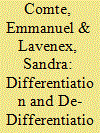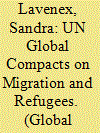| Srl | Item |
| 1 |
ID:
183850


|
|
|
|
|
| Summary/Abstract |
The leading policy objective in EU differentiation underlying border controls, asylum and police cooperation has been to achieve the abolition of internal border controls to create a borderless European single market. Germany has been the main proponent kickstarting and maintaining this agenda through differentiation. For roughly two decades, differentiation has proved effective in abolishing internal border controls, integrating the related cooperation into EU structures, enlisting the cooperation of non-EU member states and producing joint policy outputs on asylum, external borders and police affairs. Yet, growing external migration challenges have undermined the effectiveness and legitimacy of existing arrangements, ushering in disintegration tendencies.
|
|
|
|
|
|
|
|
|
|
|
|
|
|
|
|
| 2 |
ID:
058983


|
|
|
| 3 |
ID:
183845


|
|
|
|
|
| Summary/Abstract |
The mounting phenomenon of differentiated integration in the EU has hitherto been studied mainly with regard to its drivers and legal configuration. Taking the existence of differentiated integration as a given, a conceptual framework is developed for analysing its governance in practice and the conditions under which this is effective and legitimate. Referring to examples from monetary integration and Justice and Home Affairs, the framework emphasises the interplay between the legal and organisational dimensions of differentiated integration, between commitment to common policies and opportunities for participation in their development and implementation. This includes measures for assessing and conditions for explaining the effectiveness and legitimacy of differentiated integration.
|
|
|
|
|
|
|
|
|
|
|
|
|
|
|
|
| 4 |
ID:
175402


|
|
|
|
|
| Summary/Abstract |
As process-oriented, inclusive, legally nonbinding frameworks deemed to promote cooperation in the pursuit of agreed objectives, the Global Compacts for Migration and Refugees adopted in December 2018 introduce modes of experimentalist governance in fields where states have hitherto opposed (new) multilateral commitments. This article retraces the introduction of experimentalist elements in the compacts’ architecture and critically discusses their potential and limits in such contested policy fields. It concludes that given the depth of normative and distributive conflicts, the compacts are unlikely to generate substantive innovation, as experimentalist theory would suggest. They may, however, help to counter the erosion of existing commitments.
|
|
|
|
|
|
|
|
|
|
|
|
|
|
|
|
| 5 |
ID:
080509


|
|
|
|
|
| Publication |
2007.
|
| Summary/Abstract |
The creation of the Single European Market has been accompanied by an intense discussion on whether market-creating measures have been privileged over market-correcting ones by the institutional system of the EU. The creation of an 'Area of Freedom, Security and Justice' (AFSJ) launched by the Treaty of Amsterdam poses a similar question which, however, has remained heavily under-researched: will the balance between policing competencies and individual rights shift towards the former at the expense of the latter? Recent work on the 'new raison d'état' and the strengthening of national executives in processes of Europeanisation points in this direction. This essay explores the parallels between the Common Market and the AFSJ with regard to the relationship between the structures and substance of governance. The balance between security and individual rights is scrutinised in the main pillars of the AFSJ: asylum cooperation, judicial cooperation in criminal matters and police cooperation
|
|
|
|
|
|
|
|
|
|
|
|
|
|
|
|